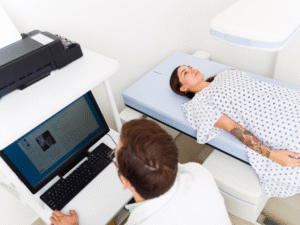Pregnancy and the birth process cause many changes in the body, some of which can certainly be jarring for new and expectant mothers who have never experienced these kinds of symptoms. The pelvic floor, in particular, is one area in which pregnant and postpartum individuals often see complications. Warning signs that don’t dissipate after a few months, like bladder and bowel incontinence, frequent and urgent urination, constipation, pain, pressure and even frequent infections could be signs that specialized treatment is needed.
The good news is that these kinds of effects are not at all uncommon, both during and after pregnancy. On the other hand, these issues often become so normalized that patients are unaware that effective treatments and therapies are available, and this is not just an issue mothers have to live with.
Postpartum Pelvic Floor Complications are Highly Treatable
“There is a lot of people who have this and don’t seek treatment because they think it’s normal,” said Allison Polland, MD, director of the Maimonides Pelvic Floor Center. “And I think I want to stress that, yes, this is common, but just because it’s common doesn’t mean it’s normal and doesn’t mean that you have to live with it. This is something that is very treatable.”
For new and future mothers, prioritizing pelvic floor health and gaining awareness of ongoing or potential complications is important. The Maimonides Pelvic Floor Center is introducing a new program called Postpartum Exercise and Recovery Liaisons for Pelvic Floor Health (PEARL), the first and only program in Brooklyn dedicated to offering state-of-the-art diagnostic and treatment services for postpartum women affected by one or more pelvic floor conditions.
“It’s for women who deliver here at Maimonides or elsewhere to address pelvic floor issues immediately after childbirth,” Dr. Polland said. “We are offering these women an opportunity to be seen by a urogynecologist, and they will have access to a transperineal pelvic floor ultrasound, which is something really unique. And we are the only place in Brooklyn that is offering that.”
Urogynecologists like Dr. Polland are urologists or OB/GYNs who have undergone extensive postresidency fellowships to focus specifically on pelvic floor reconstruction and disorders like urinary incontinence. Within the PEARL Program, they use techniques like dynamic MRIs, urodynamic testing, and urinary and bowel continence assessment in addition to ultrasounds to diagnose specific issues causing incontinence.
Individualized Treatments Are Based on Patient Need and Comfort Level
Treatment options can range from noninvasive to medications and surgical treatment. Noninvasive treatments like pelvic floor physical therapy and exercises and biofeedback methods are effective for many mothers, especially when they experience incontinence when sneezing, coughing, laughing, or engaging in physical activity.
“The way I like to explain it is, imagine squeezing your vagina and pulling it up to your belly button. It’s really a squeeze and lift. And that’s something that you can do every single day,” Dr. Polland explained. “And that can really make a difference, especially if you feel like a sneeze is coming on. If you squeeze and then sneeze, you’re less likely to leak.”
Injectable fillers like Botox are also an option, lessening the size of the urethra and making leakage less likely. Another treatment is implantation of a sacral neuromodulation device, which Dr. Polland describes as “a pacemaker for the bladder,” helping to relax the bladder and normalizing its activity.
The Pelvic Floor Center Provides a Single Destination for Multidisciplinary Care
Within the PEARL Program and at Maimonides Pelvic Floor Center, patients have access to this variety of treatments through its multidisciplinary team including a urologist, uregynecologist, general gynecologist, colorectal surgeons, and pelvic floor physical therapists.
“The idea of having this multidisciplinary team is that no matter what kind of leakage you’re having, no matter what’s going on, you know that there’s a one-stop shop that can help you,” Dr. Polland said. “And we are not just surgeons. We are not only offering one thing. We’re offering the whole range of treatments.
“So if you want to try something conservative, we have the physical therapist for that. If you want to have surgery, we have the expert surgeons for that. It’s really one place where we can deal with all of your pelvic floor needs. We see both men and women and we address the full spectrum of pelvic floor issues.”
It is important to note as well that, as with many conditions, early detection and intervention can lead to better patient outcomes, and for new moms experiencing pelvic floor dysfunction, early treatment can lessen risk of long-term symptoms and disability.




